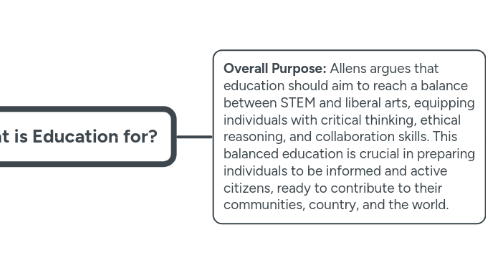Central Arguement- What is Education for?
by Katherine Heidt


1. "What is more, defending the right to civic education, and the kind of curriculum that delivers it, would benefit not only individual students, but also society as a whole, advancing both political equalty and distributive justice" (Allen 13).i
2. Diverse Perspectives Supporting Evidence
3. "Given that the liberal arts are especially useful for training citizens, it should come as little surprise that attainment in the humanities and social sciences appears to correlate with increased engagment in politicals. There is a statistically significant difference between the rate of political participation among humanities and STEM graduates" (Allen 13).
4. Civic Participation: Supporting Evidence
5. Choosing fields that make the most money rather than something of interest: "including low-income parents, whose children are more likely to see their civic education shortchanged -- have narrowed their focus exclusively to the economic field" (Allen 10).
6. Learn from historical mistakes: "To the contary, it is the job of today's scholars and teachers, learning from the success and errors of our predecessors to build the most intellectual tools we can" (Allen13).
7. Personal Develpoment: Supporting Evidence
8. Judement of citizens: "Citizens must judge whether their government meet their responsibilities, spelled out earlier in the sentence, to secure rights" (Allen 12).
9. Role of citizens: "If a government fails in its core purpose, it is the job of the citizens to figure this out and decide how to change direction" (Allen 12).
10. Moral and Ethical Development: Supporting Evidence
11. Type of education needed for particpatoray engagment: "If we are to embrace an eduation for participatory readiness, we need to aim our pedagogic and curricular work not to any one of these three capacities but at what lies behind all of them: the idea of civic agency as the activity of co-creating a way of life" (Allen 12).
12. Engagment contributes to polticial decisions: "'It is the institutions and the political equilibrium of society that determine how technology evolves, how markets function, and how they gain from various different economic arrangments are distributed'" (qtd. in Allen 10).
13. Participatory Readiness: Supporting Evidence
14. Access: "Thus he argues that education institutions should be made broadly accessible elite institutions, which serve mainly priviledged youth from the highest income brackets, should draw students from other backgrounds" (Allen 10).
15. Global Power: "'An educated, innovative, motivated workforce– human capital – is the most precious resoure of any country in this new, flat world'" (qtd. in Allen10).
16. History of the Sputnik: "The response was the National Defense Education Act, signed into law in 1958, which increased funding for science and math education, as well as vocational training" (Allen 9)."
17. Vocational Paradigm: Supporting Evidence
18. Key Term- A society that values equalities for all individuals regardless of race, gender, sexual identity, or socioeconomic status.
19. **Overall Purpose:** Allens argues that education should aim to reach a balance between STEM and liberal arts, equipping individuals with critical thinking, ethical reasoning, and collaboration skills. This balanced education is crucial in preparing individuals to be informed and active citizens, ready to contribute to their communities, country, and the world.
19.1. **Equality:** Equal opprotunity and access to education is essiental to achieving social and economic equality.
19.1.1. Educational Equality
19.1.1.1. Participatory Readiness
19.1.1.1.1. Civic Engagement
19.1.1.1.2. Informed Citizens
19.1.1.1.3. Egalitarian America
19.1.1.2. Vocational Paradigm
19.1.1.2.1. Government Funding
19.1.1.2.2. Global Competitivness
19.2. **All-around Development:** A balanced education helps create well-rounded individuals who have the skills necessary to engage in the governent.
19.2.1. Liberal Arts
19.2.1.1. Moral and Ethical Development
19.2.1.1.1. Critical Thinking
19.2.1.1.2. Ethical Reasoning
19.2.1.2. Personal Development
19.2.1.2.1. Discovering Interests
19.2.1.2.2. Learning from History
19.2.1.3. Civic Participation
19.2.1.3.1. Correlations between humanities and engagment in politics.
19.3. **Inclusivity:** Creating an government system that incorprates people from every background, specifically economically.
19.3.1. Political Inclusivity
19.3.1.1. Diverse Perspectives
19.3.1.1.1. Participants from every economic background
